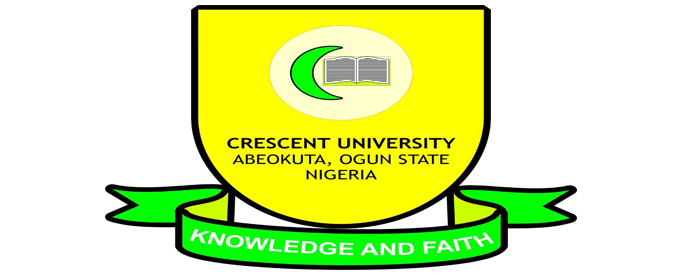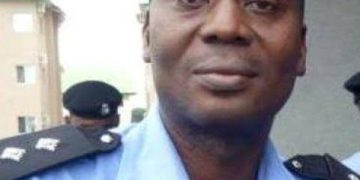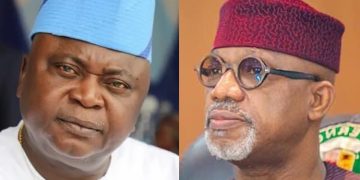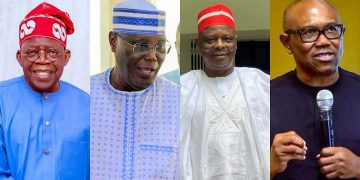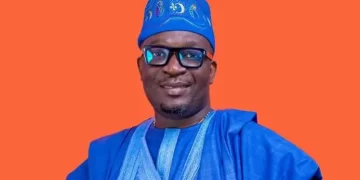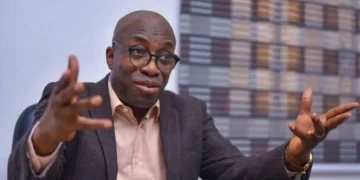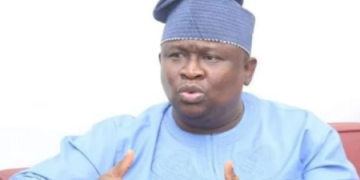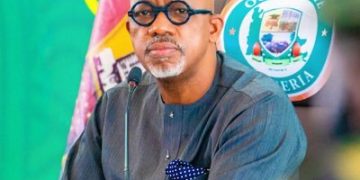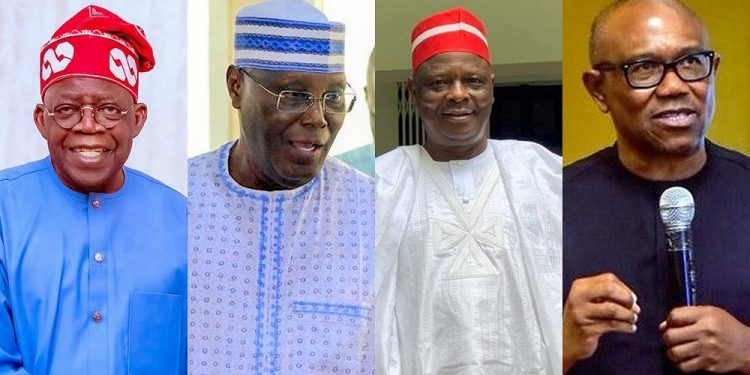By Sheriff Kosoko and Ifeoma Ihejirika
The battle ground gets more intriguing as Nigeria prepares ahead for another general election, with about 18 candidates from various political parties emerging from primary elections.
Before now, the race of who becomes the president has been one major agenda being keenly perceived to play a determining role for all political parties in choosing who eventually takes their flag flying.
Following our political system, it remains crystal clear that every party comes with multifaceted polities and objectives whenever they seek to either get to the throne freshly or retain the mandate. Hence, the availment of filling candidates who would orchestrate their plans and by all chances makes the party victorious at the poll.
With an ostrich insight over all political parties presidential primary elections that were recently conducted, it was affirmed that many alignments came up, many stepped down for consensus candidates, while some prominent politicians defected to other parties in order to achieve their ambition.
There are about 18 political parties participating in the 2023 elections, but this report will take a look at the leading political parties and those parties brought to the front burner by the calibre of candidates flying their flags. This is done without prejudice to other political parties and their candidates.
Bola Tinubu of the APC
Recently, the ruling All Progressives Congress (APC) conducted its presidential primary at the Eagles Square, Abuja and its National Leader, Asiwaju Bola Ahmed Tinubu, emerged as the candidate of the party after winning with 1,271 votes to defeat Rotimi Amaechi, who scored 316 votes and the Vice President, Yemi Osinbajo, who gulped 235 votes.
Tinubu emerged the presidential candidate of the party despite all the shenanigans deployed against him. He defeated other aspirants to embrace victory, confirming the chants by his supporters that he was the most prepared and tactical APC presidential aspirant.
Jagaban, as fondly called, is a renowned and highly favoured politician, who after serving as the Governor of Lagos State between 1999 and 2007, has become the ‘kingmaker’ for any political office holders within and outside Lagos State. He has been part of the democratic struggle of the nation which left him highly influential amidst his calibre and got his tentacle spread across the nation.
A highly rated Bola Ahmed Tinubu is with no doubt a serious contender, but one who Nigerians are concerned about his health status as to whether he is capable of the job mentally and healthily. Particularly, the uncertainty about his real age is also expected to speak otherwise of him.
But the Jagaban has proven to many that he is fit, healthy, hale and hearty, especially with the way he keeps junketing from one state to another before and after the primary.
To Tinubu, the job of a president is not block moulding or digging, all that is required is the is intellect to make the right decisions and the necessary policies to move the nation forward.
Tinubu is more favoured among others in the race. He would have the support of the voters from the South, especially the South West. This is because many Southerners want a power shift after President Muhammadu Buhari.
In the north, the former Lagos State Governor has the backing of no fewer than 12 governors. Because he is contesting under the ruling, Tinubu is expected to win in states like Kano, Katsina, Kaduna, Borno and other northern APC states.
Tinubu has promised that, “My driving vision is the transformation of this nation into a robust decentralized democracy with a diverse industrial base, to provide sufficient jobs to a growing urban population; and a sufficient agricultural base, to achieve food security and provide a decent livelihood to the rural population. I seek a nation founded on justice, peace, prosperity for all, regardless of religion, region, ethnicity and class. I seek a Nigeria that is for all Nigerians.”
Atiku Abubakar of the PDP
Atiku Abubakar, a former Vice president, has emerged the People’s Democratic Party (PDP) presidential candidate for the 2023 general election, amid horse trading and strong determination to wrest power from the incumbent All Progressives Congress (APC). The desperation by the party to win informed its decision to take some drastic measures, chief of which is the jettisoning of the zoning arrangement that is also enshrined in its constitution.
Since his inception into Nigerian politics in 1989, Atiku Abubakar has unsuccessfully contested five times for the Office of President of Nigeria in 1993, 2007, 2011, 2015 and 2019 respectively.
Meanwhile, Atiku’s victory was eagerly expected in some quarters, as he was seen as perhaps, the only aspirant, with the most formidable structure with national spread, mileage and popularity across the country capable of winning the presidential election next year.
He was also seen in many quarters as capable of mustering the war front that can give the ruling party a threatening fight. These, analysts say, may have acquainted the party’s leadership decision to jettison the zoning arrangement that is embedded in its constitution.
All of these competencies, Atiku Abubakar is known to be a very strong and unassailable candidate that the ruling party and other presidential candidates would have to lock horns with.
As strong and productive as Atiku seems to be, his incessant defeats and level of his desperation to keep contesting is a matter of botheration for all. This, Nigerians are taking a very critical time to ascertain his main mission in the nation if that could secure him the victory he longed expected.
It is believed that Atiku would give the APC a run for its money. Having contested the 2019 presidential election with millions of votes, many have opined that Atiku might be considered by Nigerians who are tired of the APC government.
Observers also predicted that the north might disappoint the APC by going with Atiku in a bid to retain power. If this happens, the South-South and the South East, which are majorly under the control of the APC may also contribute to Atiku’s victory.
However, the decision of Peter Obi, (who was Atiku’s running mate in 2019), from the PDP, is a major setback that could be a clog in the party’s wheel of progress in 2023.
Peter Obi of Labour Party
Peter Gregory Obi is a Nigerian politician and businessman. The former governor of Anambra State left the PDP before the party’s presidential primary after he had obtained the N40million nomination form.
He defected to the Labour Party when he released a statement that says, “It has been a great honour to contribute to nation-building efforts through our party (the PDP). Unfortunately, recent developments within our party make it practically impossible to continue participating and making such constructive contributions.”
Obi did not explain the developments that caused him to defect to the Labour Party all of a sudden, but this may be because the former governor had the inclination that he would not be able to battle with Atiku to clinch the PDP presidential ticket.
Since he joined the Labour Party, Peter Obi as appeared more like a regional candidate than some contesting for the nation’s presidential seat. Unless things change before the election, Obi may find it difficult to defeat either Atiku or Tinubu.
As of today, the majority of those pitching tents with Obi are people from his South East region. Also, the party under which he is contesting does not have the national spread like the APC and PDP.
Many have opined that Obi being on the ballot would divide the votes originally meant for the PDP, where he was in 2019. This, it was predicted, may give Tinubu an easy ride to power.
However, there are optimists who believe the ‘Peter Obi Revolution’ on Twitter and other social media platforms may miraculously see the Anambra man coasting home to victory.
Rabiu Musa Kwankwaso of the NNPP
Rabi’u Musa Kwankwaso is a Nigerian politician who was the Governor of Kano state from 1999 to 2003 and 2011 to 2015. After he lost his re-election in 2003, he was appointed the first Minister of Defence of the Fourth Republic with no prior military background from 2003 to 2007, under the administration of former President Olusegun Obasanjo.
In his bids to contest the 2023 presidency, Kwakwanso joined the New Nigeria Peoples Party (NNPP).
Just like Peter Obi and his LP, Kwankwaso’s NNPP is not a popular party among the Nigerian electorate. The party is known in Kano and few parts of the north, where it received aggrieved members of the major political parties.
As it stands, the NNPP does not have the strength or financial wherewithal to compete with the APC and PDP in the general elections.
Consequently, many have suggested that the duo of Kwankwaso and Obi should form an alliance towards building a stronger ‘third force’ that could wrest power from the APC and the PDP.
